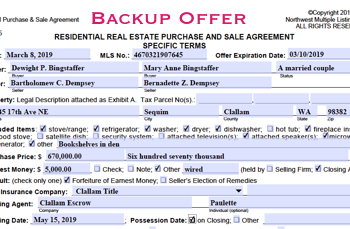A home inspection is standard procedure for a buyer who has reached mutual acceptance with a Sequim seller. Once you reach an agreement on price with the seller, you have an opportunity to have the home inspected, assuming you have attached a form 35 addendum to your Purchase and Sale Agreement (PSA). The home inspection addendum has some amazing language, which essentially gives you as the buyer the opportunity to walk away from the transaction if there is anything at all that you decide you don’t like in the home inspection report. Here is the language, and notice the word “subjective.”
Home Inspection Addendum
INSPECTION CONTINGENCY. This Agreement is conditioned on Buyer’s subjective satisfaction with inspections of the Property and the improvements on the Property. Buyer’s inspections may include, at Buyer’s option and without limitation, the structural, mechanical and general condition of the improvements to the Property, compliance with building and zoning codes, an inspection of the Property for hazardous materials, a pest inspection, and a soils/stability inspection. [Boldface added for emphasis]
Yes, this means you really could cancel the transaction within the inspection due diligence period. The default time period within which you must complete your home inspection is 10 days in our standard addendum, but for many of my clients from outside the area, I increase that to 14 days or even 20 days if we need the time to complete the due diligence on several issues.
Home Inspection is a Good Idea
It’s a good idea to have a home inspection, because a home inspector who does a thorough job may find things that don’t work or could be a serious problem. Tyler Conkle of Vanguard Home Inspections puts on his overalls and crawls through every area beneath a house with his flashlight and digital camera. If there is any sign of moisture, rotting beams, or any sign of possible pest infestation, he documents it. He goes through the attic, walks on the roof, examines the siding, the decks, and tests all of the appliances in the house, the furnace, heat pump, and goes through an extensive check list. This service is well worth it for only $400.
Home Inspection Response
If you do find a serious issue that you want to address with the seller, you must use a form 35R, which is an Inspection Response form. In that form you can ask the seller to repair the problem, or you might ask for a credit at closing. If you don’t respond at all within the inspection time period, you automatically waive any right to terminate the transaction based on the Home Inspection Addendum.
Not everyone insists on a home inspection. Some buyers with a lot of experience in construction will choose to do their own inspection. Nothing wrong with that, but for most buyers I do recommend a home inspection.
Last Updated on July 21, 2011 by Chuck Marunde

































Great advice. ANY home buyer should ALWAYS get the home inspected before making too great a financial committment on the property. Especially in this type of economy.
I understand why the home inspection is in place and why the Seller’s Disclosures document is so long for California. It’s to play fair. It’s for the buyer’s protection. I don’t recall potential problems being disclosed to me when I bought (it was brand new). Perhaps they were buried inside those 3 inches of forms I hurriedly read and signed. I think I am hearing the sound of money dropping into the buyer’s pocket: Ineffective AC? Cha Ching. 5 cats that spit up hairballs on carpet? Cha Ching. Grand Theft Auto zone? Cha Ching. Near railroad tracks? Cha Ching. Non-HOA approved wood floors? Cha Ching.
Editor: Well said. I do think that “consumer protection” has swung way in favor of buyers now and against sellers.
Reading your post on home inspections reminds me of the other side of the coin–the seller and the obstacles they will face. My air conditioning has never cooled or heated my home optimally. It’s been checked and the AC experts say it “is doing what it is supposed to do.” They suggest pulling shades, using fans, etc. I fear I will need to disclose this when I sell to move to Sequim. AC is not broken and there is no defect, but it’s a known situation that legally must be disclosed in California. We also must disclose so many other things I am concerned about (pets, past leaks, re-pipe, crime level, earthquake zone info, flood zone info, noisy neighbors). It makes me wonder if I will be able to sell at all!
Answer: Good points Cocoa. Most of my buyers understand issues like the ones you mention. Every home inspection gets a list of items that the home inspector feels obligated to put down, some are minor and others are the kind you mention that you can’t do anything about. Buyers will take all these issues into consideration, and it becomes part of the price. I do think that new homes with the latest technology, heating and cooling and circulation systems have a definite advantage over older homes.